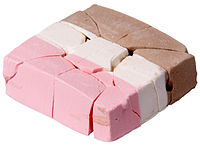
Photo from wikipedia
Abstract Liposome entrapment is a promising technology in the food industry to provide protection or controlled/targeted release to both hydrophilic and lipophilic substances. However, liposomes are obtained in the form… Click to show full abstract
Abstract Liposome entrapment is a promising technology in the food industry to provide protection or controlled/targeted release to both hydrophilic and lipophilic substances. However, liposomes are obtained in the form of suspensions which has some disadvantages with view to their use as food ingredients, namely, problems for storage, transportation, and formulation of low-to-intermediate moisture foods. So, the research on drying methods able to render dried liposomes with minimum structural changes is mandatory. In the present work, the ability of alginate as protective and carrier biopolymer during liposomal suspensions drying and rehydration was evaluated, as function of drying method (freeze-drying and spray-drying). Freeze-drying rendered sponge-like structures showing a loose porous matrix, whereas spray-drying rendered a powder composed of microparticles up to 20 μm in diameter. Both of them showed a homogeneous white-to-creamy color as well as good wettability and water dispersibility, behaving as a light viscous material upon rehydrating which is compatible with most food products. Alginate provided protection to liposomes during drying and rehydration, as only minor changes in their size and shape were observed, however, multilamellar and multivesicular vesicles were formed. Furthermore, alginate also provided protection upon reconstitution at different pHs, contrary to what happened to fresh liposomal suspensions, whereas low-to-moderate thermal treatments had a negligible effect on size and stability. The use of alginate as carrier and protective agent for drying liposomal suspensions is promising with view to the extension of their use as food ingredient, for both freeze-drying or spray-drying methods.
Journal Title: Food Hydrocolloids
Year Published: 2021
Link to full text (if available)
Share on Social Media: Sign Up to like & get
recommendations!